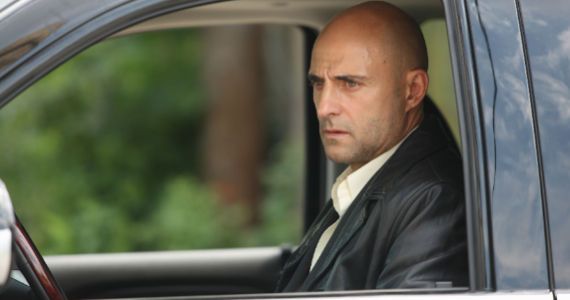Like many series operating under the pretense of prestige, Low Winter Sun works hard to ensure the viewer is aware just how distinctive the story of a cop and a "good man" committing and then attempting to get away with murder is. And the show works even harder to deliver that narrative in the most blatant and overt manner possible, repeatedly inserting phrases like "good man" or "good cop," and throwing a healthy serving of scripture and moral pontification on top, just to give it that extra-prestigious feeling.
But over the course of its first season, the series spent more time lingering over the question of how Frank Agnew and Joe Geddes would get away with their crime than the question of whether or not they should. For a series that, on the surface, is seemingly concerned with morality and notions of right and wrong and the threat of unbearable guilt, the overall impression that the show conveyed week in and week out wasn't one that was generally concerned with the same kind of things its characters were prone to talk about.
We could have a week where Joe Geddes would quote scripture with his mother and pay for his semi-estranged daughter's Catholic school education with money he received from being a dirty cop, but aside from the irony of a crooked man seemingly obsessed with words conveying general notions of morality, sin and judgment, there wasn't any real connection between the character and the series' central narrative.
That was just a portion of the series' overall drab execution and syrupy acting that squandered talents like Mark Strong, Lennie James and David Costabile by giving them either too little to do or asking (in the case of James) that they earn their cut by chewing the scenery. Ultimately, though, season 1 demonstrated how a program with what could have been a substantial and appealing plot came too late in the anti-hero swing of television, and rather than offering the audience a new or unique perspective, seemed content to ride the coattails of the movement's forefathers; those by the name of Soprano, Draper, McNulty and, especially in 2013, White.
For the most part, the delivery of Low Winter Sun's story was so scant that by the time it'd reached it's penultimate episode, 'Ann Arbor,' the question posed by a uniformed police officer (about whether or not there was enough gas in his patrol car to shuttle Frank Agnew back to Detroit) seemed oddly suggestive of the season's storyline as a whole. In essence, there never seemed to have been enough gas in the tank to take it where it wanted to go, and part of that was due to the fact that the series was driving in circles ever since Frank and Joe drowned Brendan McCann in a the sink of an Italian restaurant.
Early on there appeared to have been a potentially interesting challenge between Frank and Costabile's Simon Boyd with regard to who could stay one step ahead of the other. The idea being Frank's account of McCann's death would be aided by the fact that he was the lead investigator on the case, while Boyd would work tirelessly to uncover the truth about the death of a crooked cop he rightly believed was murdered by one or more of his own. Of course, that idea lasted until the end of episode 2, when the series began to divert more and more of its attention toward James Ransone's wannabe kingpin Damon Callis and his mostly disinterested (and utterly uninteresting) crew of street toughs.
Subsequently, each episode after that attempted to pile more on the show's plate, adding to the problem of too little story for too many characters by introducing additional plot points and characters with little or no relation to the main narrative. While this managed to stall for time and give the series the 10 episodes that'd been ordered by the network, the effect was a further dilution of what little depth the characters already had.
Most troublesome was the indistinct depiction of Frank. What started out as a conflicted man compelled to commit murder out of grief quickly gave way to a sad, deluded middle-aged cop who fixated on a woman he hardly knew and allowed himself to continually be played by. By the time 'Ann Arbor' culminated with Frank in his ex-wife's house pointing a gun at himself, there was simply nothing left of the character to like, let alone be interested in. He was feckless and dishonest, and completely out of touch with the person he actually was. That's actually a familiar trope in the anti-hero rulebook, but it's unclear whether this was just the result of indistinct and vague writing, or if that was the intent of the series from the get-go.
However, when you take into consideration the impetus for Frank killing McCann is later actually committed by Joe Geddes – and leads to absolutely zero ramifications – the answer to the previous question suddenly becomes clear.
And when things segue into the final chapter, 'Surrender,' with some guy patting Frank on the back like he's congratulating Jerry Maguire on his memo/mission statement, something else becomes entirely obvious: If the episodes between the series premiere and the season finale felt largely inconsequential, it's because by all accounts they were. The frantic throat clearing of 'Ann Arbor' was one thing, but when it all boils down to ex-cop Sean Foster (Trevor Long) inexplicably taking the wrap for Frank and Joe's crime – and exhibiting an incredible amount of concentration and memorization for a man with a severe drug addiction and who just had his rotting tooth pulled with a pair of pliers – the entire season was not much more than one extended and forced cough.
In the end, Low Winter Sun succeeded in demonstrating how having a premise rife with moral conflict and darkness is great, but having a storyline and characters capable of making that premise pay off is even better.
_____
Screen Rant will keep you posted as to the future of Low Winter Sun as information is made available.
Photos: Mark Preston/AMC



